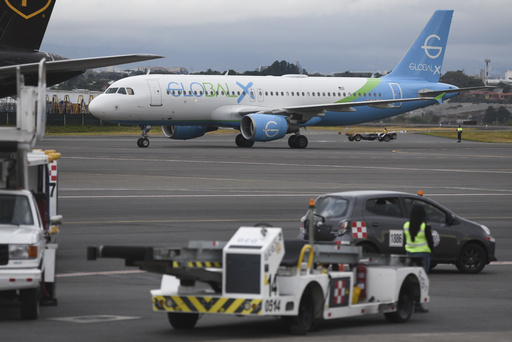SAN JOSÉ, Costa Rica — On Thursday, a plane touched down in Costa Rica’s capital carrying a group of 135 deportees from various countries including Uzbekistan, China, Afghanistan, and Russia. This marked the inaugural flight of deportees that Costa Rica has agreed to hold in detention facilities as part of a plan orchestrated by the Trump administration, allowing for their eventual return to their native countries. Among the deportees, half were minors, highlighting the growing migration crisis and the role of Central American nations caught up in U.S. deportation policies.
Costa Rica joins countries like Panama in the arrangement to temporarily house deportees from predominantly Asian countries while their repatriation plans are finalized. In a related development, Honduras also facilitated the transfer of deportees on the same day, handling a flight from Guantanamo Bay to the U.S. and Venezuela.
Upon their arrival, the migrants will be transported to a rural detention facility near the Panama border, where they can be held for as long as six weeks before being repatriated, according to Omer Badilla, Costa Rica’s deputy minister of the interior and police. The financial burden for these operations will be covered by the U.S. government, reinforcing the arrangement made during U.S. Secretary of State Marco Rubio’s visit earlier this month.
Costa Rican President Rodrigo Chaves expressed the nation’s intention to support its “economically powerful brother from the north,” referring to the U.S. The agreement has received criticism from human rights advocates due to concerns over the treatment of the detainees in Costa Rica. Questions have arisen regarding the deportees’ eligibility for asylum and the adequacy of screenings before they are sent back to their home countries or possibly redirected to other nations.
Earlier this week, Panama accepted a larger group of 299 deportees from various countries, maintaining them in hotel rooms under police supervision. Those who chose not to return voluntarily were moved to a remote camp near Darien province, which borders Colombia. Badilla emphasized that Costa Rica aims to avoid creating conditions similar to those faced by migrants in Panama, opting for their temporary detention in a facility instead.
In addition to these arrangements, Honduras executed a transfer of Venezuelan deportees from a U.S. flight that landed at a joint military base. Following a brief holding, the Venezuelans were sent on a separate aircraft back home. The Honduran foreign ministry clarified that this type of transfer is not typical, but the Central American country is willing to assist in future movements between the two contrasting nations.
The recent arrival included families, with the majority being children—65 in total—alongside two pregnant women and an elderly female deportee. Badilla noted that many of those on board had indicated their willingness to return to their countries voluntarily. Should any refuse, Costa Rica is prepared to offer potential refugee options or collaborate with the U.N.’s International Organization for Migration (IOM) to facilitate safe passages to alternative locations.
“We are dedicated to ensuring human rights in Costa Rica. We have a moral obligation to guarantee these individuals are returned safely,” Badilla remarked. He assured that the detained migrants would be accompanied by representatives from the U.N., the Red Cross, and other humanitarian organizations throughout their stay in the facility.
The designated holding site, a repurposed factory, has faced criticism for its conditions. During an earlier inspection in October 2023, it was reported that migrants were confined in cramped quarters, leading many to express feelings of imprisonment. Although Badilla claimed there have been improvements since then, access to the facility for journalists has been denied.
The facility is also set to handle a “reverse flow” of migrants returning from the U.S. to Venezuela, Colombia, and Ecuador, with an estimated 50 to 75 individuals entering Costa Rica daily with intentions of going back home. In a statement, the IOM clarified its role as providing humanitarian assistance while supporting voluntary returns and identifying safe alternatives for other migrants, asserting that they do not engage directly in the detention processes.




